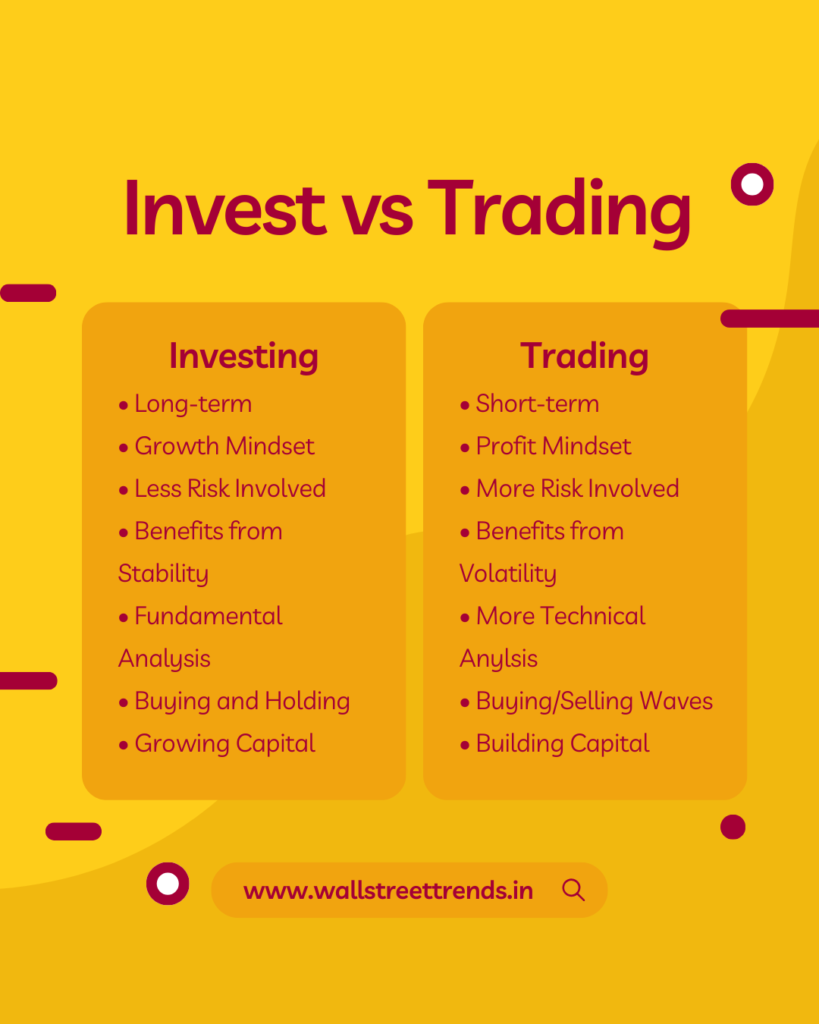Table of Contents
Recommended For You
Stock Market Basics for Beginners: Key Questions to Ask
Before diving into stock investments, especially in emerging sectors, beginners should reflect on four key questions to make the best investment choices. These questions are designed to help you understand stock market basics and guide you on how to invest in stock market for beginners.
1. Is there something that isn’t going to change?
One of the safest ways for beginners to invest in the stock market is by focusing on sectors that are unlikely to change in the foreseeable future. Essential goods and services are perfect examples. These are products people use daily, and the demand for them remains constant over time. Investing in companies that produce essential items can provide stable, long-term returns.
Examples:
- Fast-Moving Consumer Goods (FMCG): Companies like Hindustan Unilever (HUL) in detergents and Colgate in oral care are leaders in the market. They consistently grow because their products are everyday necessities.
- Automobiles: Maruti Suzuki and Tata Motors, known for manufacturing petrol and diesel vehicles, maintain a stronghold in the automotive sector. Even though electric vehicles are gaining traction, demand for conventional vehicles remains steady.
Investment Strategy:
For beginners in the stock market, investing in such stable sectors can be a smart and safe option. These sectors provide slow but steady growth, and their stocks can offer consistent returns over time. This is an excellent foundation for beginners learning how to invest in stock market for beginners.
2. Is there something that is sure to change?
Some changes in the market are inevitable, driven by technology and innovation. As a beginner, identifying sectors that are evolving can be a great way to capitalize on growth opportunities. However, it also comes with risks, as predicting the future can be uncertain.
Examples:
- Artificial Intelligence (AI) and Machine Learning: Companies like Google, Microsoft, and NVIDIA are at the forefront of AI. As AI becomes increasingly integrated into various industries such as healthcare, education, and manufacturing, these companies stand to benefit significantly.
- Electric Vehicles (EVs): The rise in electric vehicle production has been driven by increasing fuel costs and environmental concerns. Companies like Tesla and Tata Motors are leading the EV revolution.
Investment Strategy:
Investing in sectors that are sure to change offers a unique opportunity for substantial growth. However, these sectors carry more risks due to uncertainty. Beginners should carefully research these areas and ensure they understand stock market basics before committing capital. The high potential for growth is enticing, but caution and proper timing are critical when learning how to invest in stock market for beginners in such evolving fields.
3. Is there something that is probably going to change?
While some market shifts are certain, others are still speculative. As a beginner, investing in speculative sectors requires more research and caution. These areas may offer tremendous opportunities, but they also carry higher risks since the outcome is less predictable.
Examples:
- Smartphones and Web Glasses: Experts believe web glasses could potentially replace smartphones in the future. However, the timeline and success of this transition are uncertain.
- Robotics: While robotics shows promise, it is still debatable how widespread the adoption will be. Some industries, like manufacturing and healthcare, are integrating robots, but the scale of this change remains unknown.
Investment Strategy:
Investing in sectors with uncertain futures is inherently riskier. Beginners should adopt a long-term approach and diversify their investments in these areas. Patience is key, as these sectors may take years to realize their full potential. When learning stock market basics, it’s wise to invest gradually and avoid putting all your funds in speculative ventures.
4. Is there something that is going to end?
Certain industries and products are becoming obsolete due to technological advances and changing consumer preferences. As a beginner, it’s important to avoid investing in sectors that are on the decline. Knowing how to invest in stock market for beginners also involves understanding which sectors to avoid.
Examples:
- DTH Services: The rise of OTT platforms and online streaming has diminished the demand for traditional DTH services.
- Camera Films: The introduction of digital cameras and smartphones has drastically reduced the market for camera films.
Investment Strategy:
Avoid sectors that are clearly declining or becoming obsolete. Investing in such industries may lead to losses as their growth potential is limited or non-existent. Instead, shift your focus towards growth-oriented sectors that align with future trends.

How to Invest in Stock Market for Beginners: Key Factors to Consider
Selecting the right companies for investment is a critical part of understanding stock market basics for beginners. Here are some essential factors to help you choose the best stocks for long-term growth.
1. Financial Health of the Company
Before investing, analyze the company’s financial health. Look at key financial statements like the balance sheet, income statement, and cash flow statement.
- Revenue Growth: Check if the company’s revenue has shown steady growth over the last 3-5 years.
- Profit Margins: A company with increasing profit margins is better at managing its operations.
- Debt: A healthy company should have a low debt-to-equity ratio. Excessive debt can lead to financial struggles, even for profitable companies.
2. Promoter Holding and Leadership
The promoter’s stake in a company reflects how much faith its founders and owners have in that company. When the promoter’s stake is high and is consistently stable or increasing, it is a positive sign for the company.
Reduction in promoter’s stake: If the promoters are selling their stake, it can be a matter of concern. This indicates that the promoters are not very excited about the company’s future.
Company’s Leadership (Management Quality): The leadership of the company and its management are an important part of its success. If the company’s management is efficient and experienced, it can take the company forward by taking good decisions in the future.
3. Competitive Advantage
A successful company must have a competitive advantage in its sector. This means that the company must have something that makes it better than its competitors. This advantage can be in the form of technology, brand value, supply chain, innovation, or customer base.
Brand Value: Companies that have strong brand value can perform well even in difficult times.
Product Diversification: If the company has a diverse product portfolio, it provides it stability in the market.
4. Free Cash Flow
Free cash flow is the amount that is generated from operations and can be used for expansion or investment of the company. It also indicates how liquid the company is and how capable it is to run its operations. If the company has good free cash flow, it is a sign that it is managing its financial position properly.
Importance of free cash flow: This shows how well a company can pay off its debt, invest in new projects, and pay dividends. A company that is generating positive free cash flow can be a strong option for long-term investment.
5. Valuation of the Company
To invest in the right company, it is very important to evaluate its stock. Sometimes even good companies are not right for investment due to overvaluation. The valuation of a company is done on the basis of its P/E (Price to Earnings) ratio, P/B (Price to Book) ratio, and other valuation metrics.
P/E Ratio: If the P/E ratio of a company is very high, it may mean that the stock is overvalued. You should invest in companies whose P/E ratio is around their industry average.
P/B Ratio: This shows the value of a company’s stock compared to its book value. If this ratio is too high, the stock may be expensive.
6. Industry Analysis
The performance of a company also depends on the sector it is operating in. If there is growth potential in the sector, then the leading companies in that sector will also grow.
Sector Future: You should see how fast the sector in which the company is located is growing. Some sectors such as green energy, healthcare, and fintech have immense future potential.
Company’s Market Position: If the company is a leader in its sector, it can make the most of the growth of the sector.
7. Dividend Payout
The company’s track record of paying dividends indicates that the company is making profits and benefiting its investors. This can be an additional source of income and reflects the financial strength of the company.
Companies that pay regular dividends: If a company pays dividends regularly, it means that it is profitable and has a strong cash flow position. This is a sign of a safe investment for long-term investors.
8. Risk Factors
Every company has certain risk factors associated with it, which are important to understand. These risks may be related to the company’s business, competition in the industry, government policies, and global economic conditions.
Impact of Regulatory Policies: See if the company can be affected by government policies or laws. For example, changes in environmental policies may make investing in certain sectors risky.
Future Challenges: What challenges can the company’s product or service face in the future? If the company has a proper plan to protect its business from these challenges, then it can be a positive sign.

How To Invest Cautiously In Emerging Sectors?
It is important for new investors to move cautiously in emerging sectors. Sectors that have growth potential often also have risks associated with them. Therefore, you should keep some points in mind:
Stay away from high-risk sectors:
Not every new sector has growth potential. Some sectors have high risk, such as highly turbulent industries in technology. Investing in such sectors as a new investor can be risky, as their direction is not clear. Therefore, you should invest only in sectors that are stable and have good growth prospects in the future.
Choosing the right time:
A large part of successful investing depends on making decisions with the right information at the right time. If you invest at the right time, you can get good returns. To invest in emerging sectors, it is important that you keep a constant eye on market trends and industry news.
Invest with a long-term view:
When investing in emerging sectors, you should think long-term. Beginner investors in such sectors often have to be a little patient as growth is slow. If you invest with the aim of making short-term profits, you may make the wrong decision. Therefore, it is better to invest for the long term and give time to the growth of the sector.

Key examples of emerging sectors
Green Energy:
Currently, the green energy sector is emerging rapidly due to increasing awareness on environmental protection and climate change issues. The use of clean energy sources like solar, wind, and hydropower is increasing. Governments are also making policies in this direction, which further strengthens the growth prospects in this sector.
Example:
Companies like Tata Power and Adani Green are emerging as leaders in the green energy sector in India. Investing in their shares can be beneficial in the long run, especially when the demand for clean energy will increase rapidly.
Healthcare and Biotechnology:
The COVID-19 pandemic has taken the healthcare and biotechnology sector to new heights. There are constant changes in it due to research and innovation and this sector is growing rapidly. From vaccine development to medical devices, there are plenty of investment opportunities in this sector.
Example:
Companies like Sun Pharma, Dr. Reddy’s Laboratories, and Biocon are leaders in the healthcare and pharmaceutical sector in India. Investing in these can be beneficial for the long term.
Fintech (Financial Technology):
The Fintech sector has shown tremendous growth due to the increasing influence of digitalization. Due to new technologies like digital payments, cryptocurrency, and blockchain, the Fintech sector will grow even faster in the coming times.
Example:
In India, companies like Paytm, PhonePe, and Razorpay are making their mark in the Fintech industry. Investing in this sector can be a sign of long-term benefits.
Importance of correct information
To invest in the right sectors, you must have good knowledge of the market. For this, you have to do continuous research and understand the opinion of experts. Apart from this, it is also important to study investment related reports, news, and financial analysis. You can do a detailed analysis of any company using research platforms. This will help you make the right investment decisions.
Accurate and up-to-date information is essential for making sound investment decisions in the stock market, especially for beginners who are still learning the ropes. The stock market is inherently volatile, and decisions based on incorrect or incomplete data can lead to substantial financial losses. Proper research helps investors understand a company’s financial health, such as its revenue, profit margins, debt levels, and management quality. It also offers insights into broader market trends, allowing investors to anticipate sector shifts, regulatory changes, or macroeconomic factors that can impact their investments.
Information isn’t just limited to company earnings or stock prices. Factors like industry developments, geopolitical events, and even natural disasters can significantly influence market conditions. For example, a sudden shift in government policy or technological advancements can create opportunities or risks for specific sectors, and investors need to be aware of these changes in real time. Furthermore, understanding investor sentiment and market psychology can also provide important context for stock price fluctuations.
Relying on credible sources such as financial news outlets, official reports, and analytical tools is critical for staying informed. Using platforms that provide comprehensive stock analysis, such as balance sheets, earnings reports, and expert opinions, allows investors to evaluate their choices carefully. Ultimately, successful stock market investing requires a disciplined approach backed by the correct information, enabling investors to make informed decisions that align with their financial goals.
Conclusion: Mastering Stock Market Basics for Beginners
Learning how to choose stocks for beginners involves understanding stock market basics and carefully analyzing sectors and companies before investing. Ask the right questions, do thorough research, and take a long-term view. By following these strategies, beginners can build a strong foundation and navigate the stock market confidently.
FAQs
1. What are the best sectors for beginners to invest in?
Sectors like green energy, healthcare, and fintech offer strong growth potential, making them great choices for beginners.
2. What should beginners consider before investing in stocks?
Beginners should analyze a company’s financial health, management, debt levels, and market position before making an investment.
3. Is it safe to invest in high-risk sectors?
High-risk sectors can offer significant returns but are more volatile. Beginners should proceed with caution and ensure they understand the risks involved.
4. Why are dividend-paying companies a good investment?
Dividend-paying companies are often financially stable and provide investors with an additional source of income, making them a safe option for long-term investment.
5. How can beginners time their investments correctly?
Beginners should stay informed about market trends and sector news, ensuring they invest when growth potential is high.
Disclaimer : The aim of every content at Wall Street Trends is solely for information & educational purposes. financial awareness & literacy in our Bharat!
Thus, We aim to promote We are not SEBI Registered & don’t offer PMS/Advisory, nor any kind of Account Handling Service.
Stock Market Investments are subject to Market Risks.
The returns are never guaranteed, assured or linear.
Do consult your SEBI Register Advisor before making any Investment Decision.












Thanks for sharing your info. I truly appreciate your efforts
and I will be waiting for your further post thanks once again. https://Lvivforum.PP.Ua
Thanks for sharing youur info. I truly appreciate your efforts and I will be waiting for your further post thanks once again. https://Lvivforum.PP.Ua